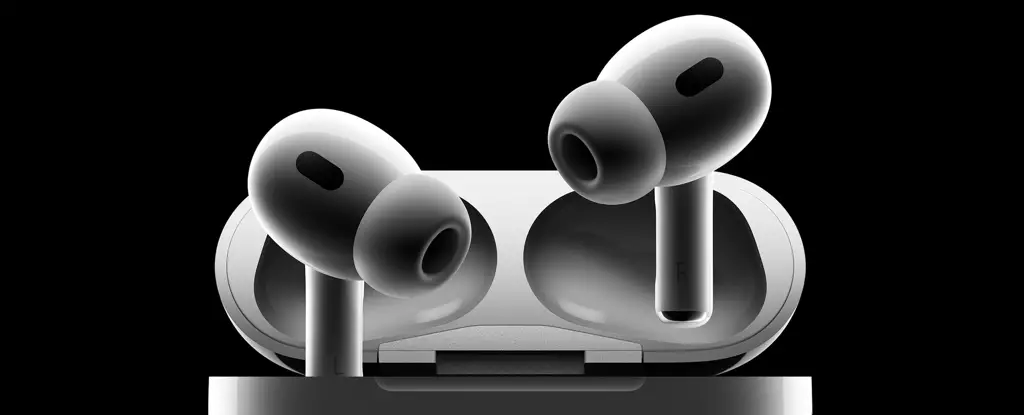On Thursday, Apple made a significant move in both healthcare technology and personal audio devices by receiving approval from US regulators to integrate a groundbreaking feature into its AirPods Pro 2 earbuds. This new functionality positions the AirPods as potential hearing aids, aiming to transform an industry that has traditionally been dominated by specialized medical devices. The impact of this decision could be far-reaching, especially considering the critical public health challenge posed by hearing loss, which affects millions of Americans.
The Mechanics of the Feature
The newly authorized feature is more than just a gimmick; it’s a sophisticated tool designed to enhance the listening experience for users with mild to moderate hearing loss. The device will allow users to assess their hearing capabilities through a simple five-minute test available via their iPhone or iPad. This assessment employs tone variations across different volumes and frequencies, giving users the ability to profile their hearing. The information gathered is then stored securely in the Apple Health app, which ensures privacy while enabling the device to customize audio settings based on the user’s specific hearing profile.
The innovation doesn’t stop there. Apple’s integration means that once this hearing profile is established, it isn’t limited to making phone calls or listening to music specifically; it extends across multiple devices and various content types. By adjusting automatically for streaming services and phone calls, the AirPods Pro 2 can provide a seamless listening experience that’s absent in conventional hearing aids. The comparison between Apple’s implementation and traditional hearing aids is noteworthy—typically, the latter doesn’t offer such versatility, which could make Apple’s offering increasingly appealing.
In the words of FDA acting director Michelle Tarver, “Hearing loss is a significant public health issue impacting millions of Americans.” This statement highlights the critical nature of the work being done by tech firms like Apple to offer solutions that can resonate with a broader audience. The FDA’s endorsement of this new feature reflects extensive research which indicates that users find the functionality on par with professionally fitted hearing aids. This could potentially democratize access to hearing assistance for many individuals who might previously have been unable or unwilling to invest in clinical-grade devices.
The fact that the AirPods Pro 2 are priced at $249—significantly lower than many traditional hearing aids—raises the stakes even higher, as affordability remains a key factor in health accessibility. However, it remains essential to note that this innovation won’t serve everyone. For individuals with severe hearing loss or unique audiological requirements, personalized care from audiologists may still be necessary.
Health Integration: The Future of Apple Devices
This announcement is not merely about hearing aids; it reflects a broader trend where Apple is increasingly merging health tech with its devices. The company’s commitment to health is evident in the additional functions offered by products like the Apple Watch, which includes features to monitor vital health data such as irregular heart rhythms, noise exposure levels, and even women’s reproductive health indicators like ovulation. Furthermore, the recent addition of sleep apnea detection capabilities showcases Apple’s growing focus on health-oriented technology.
The wider implications of Apple’s health features extend beyond individual products. By leveraging machine learning, Apple aims to process comprehensive health data, providing users with insights that can impact their daily lives significantly. This technology could empower individuals to monitor and manage their health proactively, creating a better overall quality of life.
The response from health organizations has generally been positive. Barbara Kelley, executive director of the Hearing Loss Association of America, expressed excitement about the impact Apple’s innovation could have on ordinary consumers. By providing a product that many people already own, Apple is significantly lowering the barriers for individuals seeking hearing assistance.
Looking forward, Apple plans to introduce these features across more than 100 countries, pending health authority approvals. The response from other tech giants and traditional hearing aid manufacturers could also shape the future landscape of the hearing assistance industry, prompting more competitive innovation and driving down costs overall.
Apple’s foray into the hearing aid market with the AirPods Pro 2 marks a pivotal moment in both consumer electronics and health technology. By pairing advanced sound technology with medical utility, the company is poised to make a lasting impact on how we perceive and treat hearing loss. As this technology develops and becomes more widely available, it has the potential to improve the lives of millions around the globe, turning what was once a niche market into a more accessible and inclusive space.

Leave a Reply